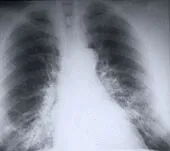Gilotrif targets a gene mutation that occurs in about 10 percent of cases
WebMD News from HealthDay

By Robert Preidt
HealthDay Reporter
FRIDAY, July 12 (HealthDay News) -- A new drug to treat advanced lung cancer has been approved by the U.S. Food and Drug Administration.
Gilotrif (afatinib) is approved to treat patients with a specific subtype of of non-small cell lung cancer (NSCLC). About 85 percent of lung cancers are NSCLC, making it the most common type of lung cancer.
Gilotrif is approved to treat tumors that carry key deletions on the epidermal growth factor receptor (EGFR) gene, long a target for lung cancer therapeutics. Mutations in the EGFR gene are thought to occur in about 10 percent of non-small cell lung cancers, and most of those mutations are targeted by Gilotrif, the FDA said.
Experts were pleased with the drug's approval.
"This drug represents a new important alternative to standard chemotherapy in the 10 to 15 percent of lung cancer patients who have EGFR mutations," said Dr. Jorge Gomez, medical director of the thoracic oncology program at Mount Sinai Medical Center in New York City. The new medication "is the first drug to be developed and approved for patients selected for EGFR mutations," he pointed out.
Dr. Len Horovitz is a pulmonary specialist at Lenox Hill Hospital in New York City. He explained that the "genetic evaluation of lung cancer tissue has evolved so that newer mutations can be targeted in treatment," and new drugs such as Gilotrif "complement standard chemotherapy [and] give hope of increased survival even in late stage lung cancer."
Gilotrif is in a class of cancer drug called tyrosine kinase inhibitors. These drugs block proteins that promote the development of cancerous cells.
According to the FDA, Gilotrif was approved alongside the therascreen EGFR RGQ PCR Kit -- a companion diagnostic that helps determine if a patient's lung cancer cells express these EGFR mutations.
Gilotrif's approval was based on a clinical study of 345 patients who were randomly assigned to receive either Gilotrif or up to six cycles of the chemotherapy drugs pemetrexed and cisplatin. Patients who received Gilotrif had a delay in tumor growth (progression-free survival) that was more than four months longer than those who received chemotherapy. However, there was no statistically significant difference in overall survival between the two groups of patients, the FDA said.
Along with common side effects such as itching, bladder inflammation, low blood potassium levels, fever, and eye inflammation, serious side effects associated with Gilotrif include diarrhea that can result in kidney failure and severe dehydration, severe rash, lung inflammation and liver toxicity, the agency said.
Gomez said the speed of the FDA's approval was encouraging.
"The development and approval of afatinib was significantly shorter [than that seen with prior lung cancer drugs] and reflects a clear focus toward individualizing lung cancer therapy to specific patients who are most likely to have a significant benefit," he said. "This is a clear push toward more personalized medicine."
Dr. Richard Pazdur, director of the Office of Hematology and Oncology Products in the FDA's Center for Drug Evaluation and Research, agreed.
In an agency statement, he said that Gilotrif's approval shows "how a greater understanding of the underlying molecular pathways of a disease can lead to the development of targeted treatments."
In May, the FDA approved Tarceva (erlotinib) for treatment of patients with non-small cell lung cancer. That drug was approved at the same as the cobas EGFR Mutation Test, a companion diagnostic to identify patients with tumors having the EGFR gene mutations.
Gilotrif is marketed by Boehringer Ingelheim Pharmaceuticals Inc. of Ridgefield, Conn. The companion diagnostic test is marketed by Qiagen.
source : FDA Approves New Drug for Advanced Lung Cancer








